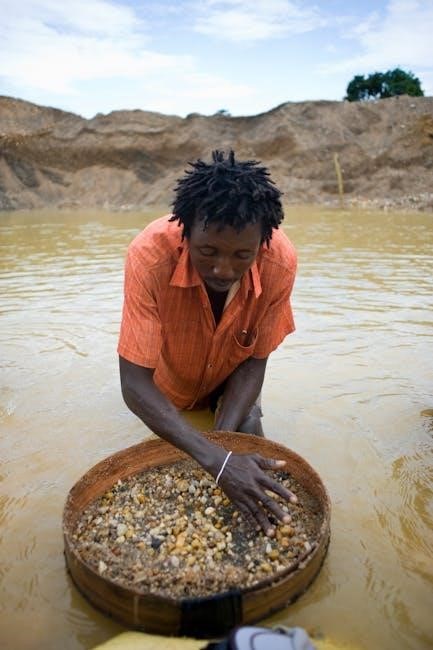African underdevelopment refers to the continent’s enduring socio-economic challenges‚ rooted in historical injustices like colonialism and the slave trade‚ perpetuated by weak governance and external exploitation․
Definition and Scope of Underdevelopment in Africa
Underdevelopment in Africa refers to the persistent economic‚ social‚ and political challenges that hinder the continent’s progress․ It is characterized by low per capita income‚ limited industrialization‚ and inadequate access to education and healthcare․ The scope extends beyond economic metrics‚ encompassing institutional weaknesses‚ corruption‚ and the legacy of colonial exploitation․ Africa’s underdevelopment is deeply rooted in historical injustices‚ such as the slave trade and extractive colonial systems‚ which disrupted local economies and societies‚ perpetuating dependency and inequality․ This multidimensional issue requires a comprehensive understanding of its causes and effects․
Historical Context of African Underdevelopment
The historical context of African underdevelopment traces back to the transatlantic slave trade and colonialism․ These systems disrupted local economies‚ depopulated regions‚ and undermined indigenous development․ Colonization introduced extractive institutions that prioritized resource exploitation over local needs‚ leaving legacies of inequality and instability․ Post-independence‚ many African nations struggled with weak governance‚ conflict‚ and external interference‚ further entrenching underdevelopment․ These historical factors created a trajectory of dependency and hindered the continent’s ability to achieve sustainable growth and self-determination‚ shaping its current socio-economic challenges․
Root Causes of African Underdevelopment
The transatlantic slave trade and colonialism fundamentally disrupted African societies‚ creating long-term economic and social distortions․ Weak governance‚ corruption‚ and external exploitation further perpetuated underdevelopment․
The Impact of the Slave Trade on Africa’s Economy and Society
The transatlantic slave trade devastated Africa‚ draining human capital and disrupting societies․ Millions were forcibly removed‚ leading to depopulation and a loss of skilled labor․ This weakened economies‚ halted technological progress‚ and created social instability․ The trade also fostered internal conflicts as kingdoms raided each other for slaves‚ further destabilizing the continent․ The economic structures were distorted‚ shifting focus from sustainable development to serving external demands․ The societal fabric was torn apart‚ leaving lasting scars that hindered Africa’s ability to advance independently․
Colonialism and Its Legacy of Extractive Institutions
Colonialism implanted extractive institutions in Africa‚ designed to exploit resources for European benefit․ These systems prioritized resource extraction over local development‚ stifling industrialization and perpetuating dependency․ Post-independence‚ many nations inherited weak institutions ill-equipped for sustainable growth․ Colonial policies disrupted traditional economies‚ fostering inequality and underdevelopment․ The legacy includes unbalanced economic structures‚ limited infrastructure‚ and governance challenges‚ hindering Africa’s ability to achieve self-sustaining development․ This institutional framework continues to undermine long-term economic progress and social stability across the continent․

leadership and Governance Issues

Leadership and Governance Issues
Poor leadership‚ corruption‚ and weak institutions have hindered Africa’s development‚ perpetuating underdevelopment through mismanagement of resources and failure to implement effective policies for sustainable growth․
Corruption and Its Role in Perpetuating Underdevelopment
Corruption is a pervasive issue in Africa‚ diverting resources meant for development into private pockets‚ undermining public institutions‚ and discouraging foreign investment․ It fosters inequality‚ weakens governance‚ and perpetuates poverty by depriving citizens of essential services․ Corruption also distorts economic policies‚ benefiting elites while hindering sustainable growth․ Its entrenched nature has made it a significant barrier to progress‚ perpetuating underdevelopment by eroding trust in leadership and undermining efforts to build functional institutions․ Addressing corruption is critical to achieving meaningful development in Africa․
Weak Institutions and Poor Governance in Africa
Weak institutions and poor governance are critical barriers to Africa’s development․ Ineffective legal systems‚ lack of accountability‚ and political instability undermine economic growth and social progress․ Poor governance often leads to mismanagement of resources‚ corruption‚ and policy inefficiencies‚ discouraging investment and hindering innovation․ Without robust institutions‚ African nations struggle to implement policies that promote equality‚ education‚ and infrastructure development․ Addressing these challenges requires strengthening institutional frameworks to ensure transparency‚ accountability‚ and effective leadership‚ which are essential for sustainable development and prosperity across the continent․

Economic and Social Factors
Economic and social factors significantly contribute to Africa’s underdevelopment‚ with heavy reliance on primary commodities‚ lack of industrialization‚ poverty‚ inequality‚ and limited access to education․
Dependence on Primary Commodities and Lack of Industrialization
Africa’s reliance on exporting raw materials without processing exacerbates underdevelopment‚ as it limits economic growth and perpetuates dependency on global markets․ The lack of industrialization hinders technological advancement‚ trapping economies in low-value production․ This dependency makes African nations vulnerable to fluctuating global commodity prices‚ reducing their ability to generate stable revenue․ Without industrialization‚ the continent struggles to diversify its economies‚ leading to persistent poverty and inequality; This cycle underscores the urgent need for structural economic transformation to achieve sustainable development․
Poverty‚ Inequality‚ and Limited Access to Education
Poverty and inequality are entrenched in Africa‚ with widespread disparities in income and access to resources․ Limited access to quality education exacerbates these issues‚ hindering human capital development and perpetuating cycles of poverty․ Many African nations struggle with high illiteracy rates and inadequate educational infrastructure‚ particularly in rural areas․ This limits opportunities for economic mobility and exacerbates social inequalities․ Addressing these challenges is critical to fostering inclusive growth and reducing the gap between the privileged and marginalized populations across the continent․
External Factors Contributing to Underdevelopment
Globalization and neocolonialism have perpetuated African underdevelopment by fostering unequal trade relations and exploiting natural resources‚ while foreign powers maintain economic control over African economies and societies․
Globalization and Its Effects on African Economies
Globalization has intensified Africa’s underdevelopment by fostering unequal trade relations‚ where African nations export raw materials at low prices while importing finished goods at higher costs․ This perpetuates economic dependency and limits industrialization․ Multinational corporations often exploit Africa’s natural resources‚ prioritizing profit over local development․ Additionally‚ globalization increases competition‚ making it difficult for African economies to compete with developed nations․ These dynamics hinder economic growth‚ exacerbate poverty‚ and undermine efforts to achieve sustainable development‚ further entrenching underdevelopment across the continent․
Neocolonialism and Economic Exploitation
Neocolonialism continues to undermine African development by perpetuating economic exploitation․ External powers maintain control over Africa’s resources through indirect means‚ such as unfair trade agreements and foreign-owned corporations․ Multinational companies extract raw materials at minimal costs‚ leaving little benefit for local economies․ This exploitation stifles industrialization and perpetuates dependency on primary commodities․ Additionally‚ international financial institutions often impose policies that favor foreign interests over African development․ These practices ensure that wealth flows out of Africa‚ deepening underdevelopment and limiting the continent’s ability to achieve economic sovereignty and self-sustenance․
Geographical and Environmental Challenges
Africa’s geography and climate pose significant barriers to development․ Vast deserts‚ dense rainforests‚ and diverse terrains hinder infrastructure development and economic integration across the continent․
Adverse Geography and Climate Conditions
Africa’s diverse geography and harsh climate conditions significantly hinder development․ Extensive deserts‚ dense rainforests‚ and mountainous terrains create barriers to transportation and infrastructure․ Climate variability‚ including frequent droughts and floods‚ disrupts agriculture and livelihoods․ These environmental challenges exacerbate economic disparities‚ limiting access to resources and markets․ The continent’s geography also complicates regional integration‚ fostering economic isolation and dependence on external aid․ Such adverse conditions perpetuate underdevelopment‚ making sustainable growth a formidable challenge for many African nations․
Impact of Diseases on Human Capital and Productivity
Diseases like malaria‚ HIV/AIDS‚ and tuberculosis disproportionately affect Africa‚ draining human capital and productivity․ High mortality rates and widespread illnesses reduce workforce capacity‚ hindering economic growth․ The burden of healthcare costs diverts resources from education and infrastructure․ Additionally‚ diseases disrupt education systems‚ as students and teachers are often absent due to illness․ This perpetuates cycles of poverty and limits long-term development․ The impact of diseases underscores the urgent need for improved healthcare systems to address these challenges and foster sustainable development across the continent․

Way Forward for African Development
Addressing corruption and strengthening institutions are crucial․ Investing in industrialization‚ infrastructure‚ and education can drive economic growth․ Improving healthcare will empower populations‚ fostering sustainable development․
Proposing Solutions to Address Underdevelopment
Solutions to African underdevelopment include investing in industrialization‚ education‚ and healthcare to build human capital and reduce poverty․ Strengthening institutions and combating corruption are critical for sustainable growth․ Promoting good governance and leadership accountability can foster stability and trust․ Leveraging technology and innovation to drive economic transformation is essential․ Additionally‚ international cooperation and fair global trade practices can provide the necessary support for Africa’s development journey․ These measures‚ if implemented effectively‚ can pave the way for a prosperous and self-reliant Africa․
The Role of International Cooperation and Aid
International cooperation and aid are vital for addressing Africa’s underdevelopment by providing financial and technical support․ These resources help bridge gaps in infrastructure‚ education‚ and healthcare‚ essential for economic growth․ Aid also facilitates technology transfer and capacity building‚ enabling African nations to strengthen their institutions․ Moreover‚ fair trade practices and equitable global economic systems can create more opportunities for African countries․ However‚ aid must avoid dependency‚ focusing on sustainable development and self-sufficiency․ Transparency and accountability in aid distribution are crucial to ensure resources reach intended beneficiaries effectively․
